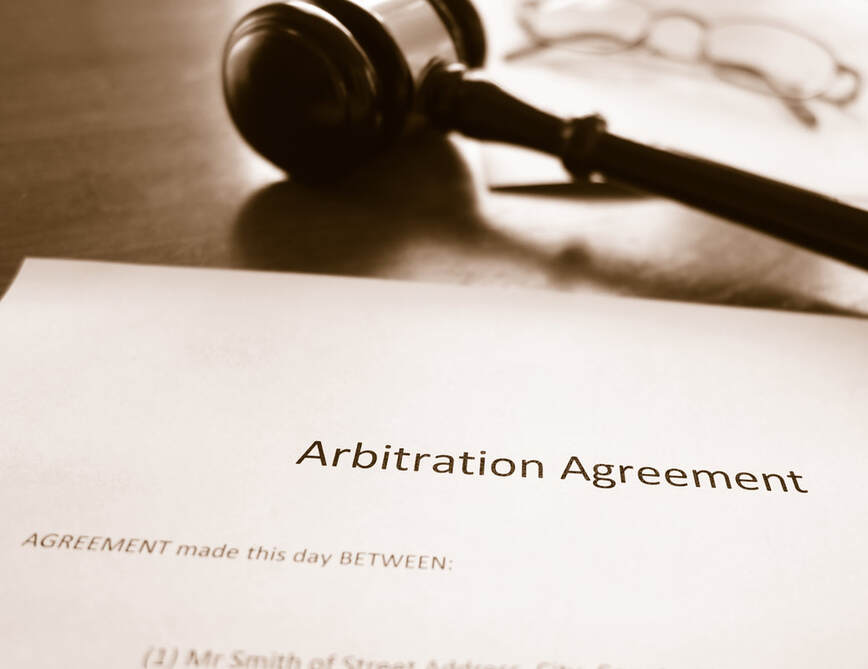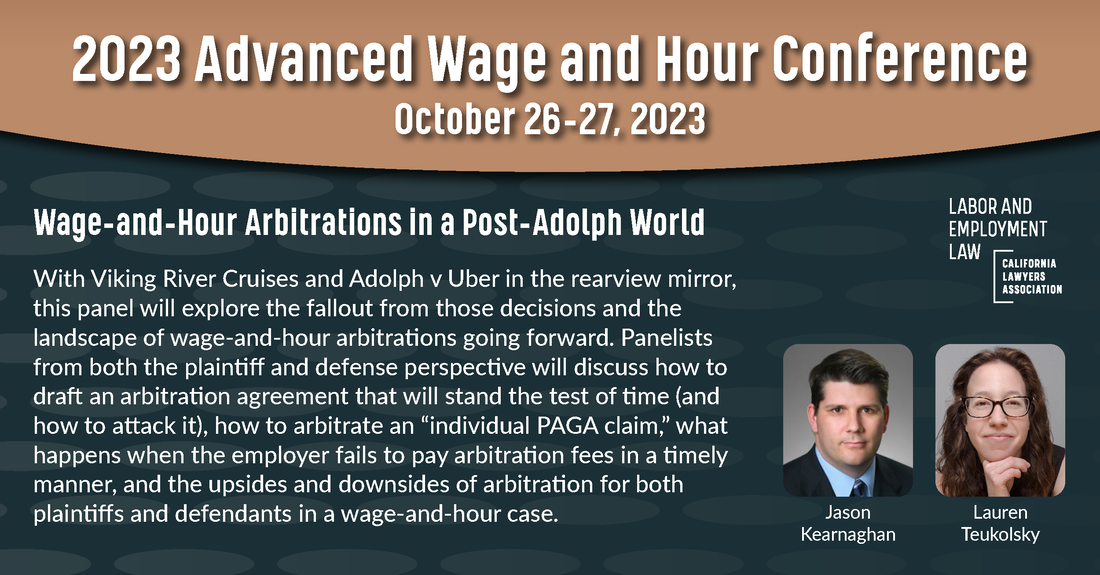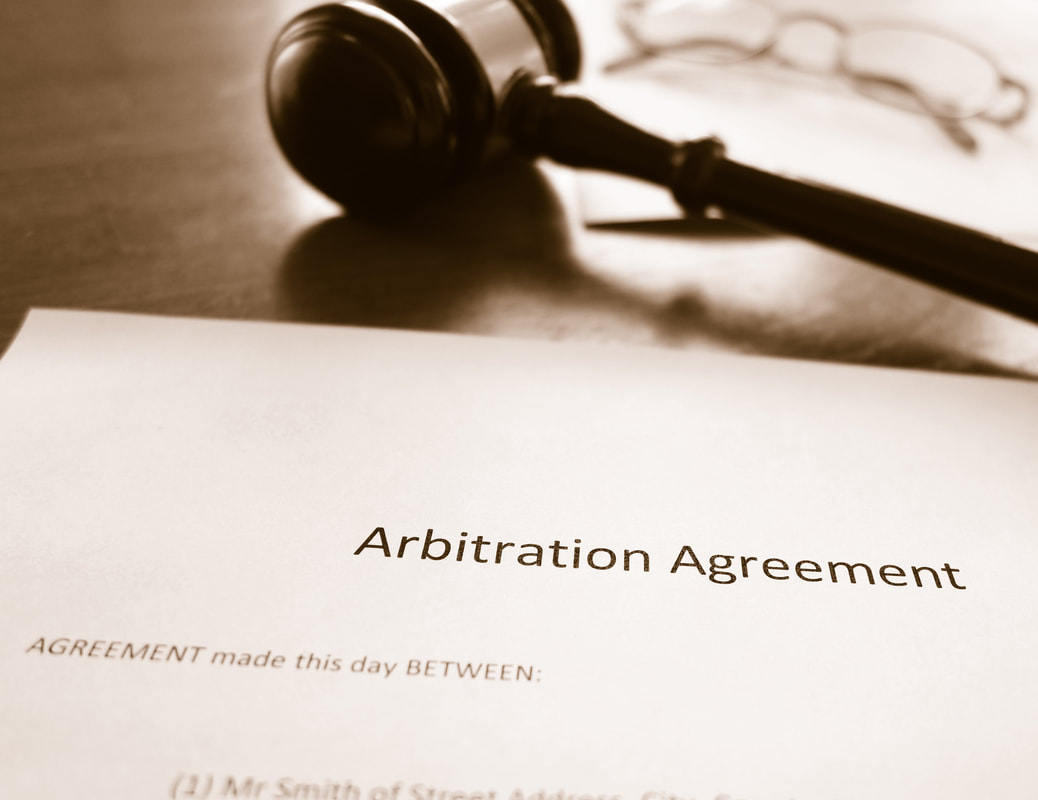|
Lauren Teukolsky will speak on an October 26th panel at the California Lawyers Association’s (CLA) 13th Annual Advanced Wage and Hour Conference. The panel will explore the effects of Viking River Cruises and Adolph v Uber on the legal landscape, particularly with respect to wage-and-hour arbitrations. Ms. Teukolsky will represent the plaintiff’s perspective while co-panelist Jason Kearnaghan, a partner at Sheppard Mullin, will represent the defendant’s views.
The two panelists will explain how to draft and attack arbitration agreements, how to arbitrate individual PAGA claims, and the upsides and downsides of wage-and-hour arbitration for plaintiffs and defendants, among other topics. Ms. Teukolsky regularly discusses the latest employment law developments at conferences and panels. In September and October, Ms. Teukolsky shared insights on Viking River Cruises and Adolph v Uber for a trio of talks hosted by the Alameda County Bar Association, the Beverly Hills Bar Association, and the California Lawyers Association. Her commentary on the two cases has also been featured in articles by the Daily Journal, Bloomberg Law and Law.com. CLA is a nonprofit, voluntary bar association serving thousands of licensed attorneys throughout California. Its Labor and Employment Law Section serves as a networking and educational forum for California’s labor and employment lawyers and non-lawyers with an interest in the field. To register for CLA’s 13th Annual Advanced Wage and Hour Conference, click here. For more information about Teukolsky Law, click here.
0 Comments
Last Saturday was the deadline for California Governor Gavin Newsom to either sign or veto the roughly 1,000 bills that made it to his desk. Below is a recap of some of the most notable employment bills that the Governor signed or vetoed.
Higher Minimum Wages Governor Newsom signed a pair of bills, AB 1228 and SB 525, that set higher minimum wages for workers in the fast food and healthcare industries. Under AB 1228, fast-wood workers’ minimum wage will be bumped to $20 an hour in April. Hundreds of thousands of healthcare workers in the state will see their minimum wage eventually increased to $25 an hour under SB 525. Employers Lose a Delay Tactic SB 365 allows employment lawsuit proceedings to move forward, rather than pause, when defendants appeal orders denying a request to compel arbitration. Governor Newsom signed the bill, effectively undercutting a tactic that sometimes-allowed employers to delay cases for years at a time. More Paid Sick Days Starting next year, California’s workers will be entitled to at least five days of paid sick leave, up from the current minimum of three days, as a result of Governor Newsom signing SB 616. Family Caregiver bill Nixed In a defeat for employees, the Governor vetoed AB 524, a bill that would have added “family caregiver status” to the list of protected characteristics that employers cannot consider when making employment decisions such as hiring and firing. No Unemployment Benefits while on Strike SB 799 would have allowed workers to collect unemployment insurance benefits while on strike. Governor Newsom vetoed the bill, citing the multi-billion-dollar debt that California’s unemployment insurance program incurred to keep benefits flowing during the pandemic. To see what other important employment bills were signed and vetoed by the Governor, click here.  Lauren Teukolsky was selected to moderate a session at CELA’s (California Employment Lawyer Association) upcoming 36th Annual Employment Law Conference. The session is titled, “Arbitrating Wage & Hour Cases from Start to Finish,” and will address strategies for plaintiff-side employment attorneys to pursue in wage-and-hour arbitrations. At the session, Ms. Teukolsky will guide a conversation with Amy Semmel, a mediator and arbitrator at Semmel ADR, Steven Tindall, a partner at Gibbs Law Group LLP, and Jason Whooper, Managing Attorney at W Law. CELA is a statewide organization that works to protect and expand the legal rights of workers through litigation, education, and advocacy. Their annual employment law conferences provide days-long arrays of educational sessions and talks in addition to serving as networking forums for California’s plaintiff-side employment attorneys. This year’s conference is in San Francisco and will begin on Thursday, September 28th. The conference will conclude on Friday, September 30th. Ms. Teukolsky has worked to protect employees’ rights for over two decades and regularly speaks at events and panels on employment law. Most recently, Ms. Teukolsky appeared on a pair of panels hosted by the Alameda County Bar Association and Beverly Hills Bar Association. To learn more about Ms. Teukolsky’s practice, click here. For more information on CELA’s 36th Annual Employment Law Conference and a complete schedule of its sessions, click here. Significant employment bills make their way to Governor Newsom’s desk ahead of crucial deadline9/15/2023  Thursday, September 14th marked the deadline for California’s two legislative bodies – the state assembly and state senate – to pass bills. Bills passed by both bodies will now head to Governor Gavin Newsom’s desk, where the governor will have one month to determine which bills to sign into law. The employment bills Mr. Newsom will consider for approval run the gamut, from legislation on caregiver discrimination to bills increasing paid sick days. Below is a recap of the bills at the governor’s desk that figure to have the greatest impact on California’s workers if approved. Family Caregiver Discrimination – AB 524 AB 524 would amend the state’s Fair Employment and Housing Act (FEHA) by adding “family caregiver status” to the list of protected characteristics that employers cannot take into account when making employment decisions such as hiring and firing. Consideration of this bill comes at a critical time. Caregivers are the fastest growing workplace identity group and may make up us much as 73% of the American workforce. More than 63 million Americans care for at least one child, and 40.4 million Americans provide unpaid care to someone aged 65 years or older. The pandemic’s aftermath and America’s rapidly aging population have only exacerbated the challenges faced by caregivers. Arbitration Appeal Delays – SB 365 When trial courts find that a forced arbitration agreement is invalid, employers frequently use delay tactics, such as filing an appeal, that can effectively pause a case for years at a time. If signed into law, SB 365 would undercut such tactics and allow employment lawsuits to move forward when defendants file appeals involving a petition to compel arbitration. WARN Act Expansion – AB 1356 California’s Worker Adjustment and Retraining Notification (WARN) Act protects employees by requiring employers to give a 60-day notice to affected employees before a plant closing or mass layoff. AB 1356 would expand the WARN Act’s protections by requiring employers to provide employees with 75 days of advance notice. It would also prohibit employers from requiring employees to waive their rights by signing onerous severance agreements with releases and non-disparagement provisions in exchange for the payment of back wages. The bill was inspired by the massive layoffs at tech companies like Google and Meta, particularly Elon Musk’s alleged mishandling of layoffs at the company formerly known as Twitter. Additional Paid Sick Days- SB 616 SB 616 would require California’s employers to provide workers with five days of paid sick leave instead of the current allotment of three. Increasing the number of paid sick will reduce the frequency at which workers, particularly low-income workers, are forced to make difficult decisions between foregoing pay and going to work sick. If signed into law, the bill is also expected to strengthen public health protections. According to the Washington Center for Equitable Growth, “paid sick leave guarantees are seen by many public health experts as one of the strongest tools in stopping the spread of infectious diseases.” For a list of other employment bills heading to Mr. Newsom’s desk, click here. The governor will have until October 14th to sign bills from this year’s legislative session into law.  Lauren Teukolsky was quoted by Bloomberg Law and Law.com in a pair of articles this week on the CA Supreme Court’s Monday decision in Adolph v. Uber Technologies, Inc.. In the highly anticipated ruling, the Court held that the state’s workers could continue to pursue representative PAGA labor claims even if their individual labor claims were forced into arbitration. The Court’s ruling is considered a huge win for California’s workers. PAGA (Private Attorneys General Act) is a state law that authorizes employees to collect civil penalties for violations against themselves and their coworkers on behalf of California’s Labor Commissioner, which has struggled to manage a backlog of cases for the past several decades. Arbitration is a private dispute resolution process that overwhelmingly favors employers and shields corporations from public scrutiny and accountability. Employers frequently require their employees to sign agreements stipulating that all claims made by them will be resolved in private arbitration as opposed to being litigated through the courts, a process that is public and more favorable to workers. A ruling in Uber’s favor would have made it very difficult to bring PAGA cases forward – due to the prevalence of arbitration agreements – and would have seriously eroded workers’ ability to enforce the state’s labor laws. Uber’s lawyers have indicated that the company is considering appealing the Court’s decision. According to analysis Ms. Teukolsky published on LinkedIn, the U.S. Supreme Court is unlikely to hear such an appeal, especially in light of its 2022 decision in Viking River Cruises, Inc. v. Moriana. She said, “It's unlikely SCOTUS will hear a case from a state supreme court involving entirely state-law issues; there must a federal question involved.” Ms. Teukolsky has represented workers for over two decades and her commentary on the latest developments in employment law is regularly featured by major publications such as Bloomberg Law, Law360, Law.com, and the Los Angeles Times. To access the Bloomberg Law article in its entirety, click here. To access the Law.com article in its entirety, click here.  Lauren Teukolsky’s commentary was featured in a recent Law360 article on the Ninth Circuit’s recent ruling that California’s A.B. 51 is preempted by federal law. AB 51 prohibited employers from forcing employees to give up their civil rights, such as the right to a jury trial and the right to appeal an adverse decision, as a condition of employment. The ruling, a reversal of the Ninth Circuit’s own prior decision in 2021, is a significant blow to the state’s workers. California Governor Gavin Newsom signed A.B. 51 into law in 2019, making it illegal for employers to force individuals to waive their right to bring civil rights cases in court as a condition of employment. Arbitration agreements typically stipulate that all claims made by workers—regardless of their severity—must be resolved under private arbitration, a process that overwhelmingly favors employers, disproportionately harms historically marginalized communities, and shields corporations from public scrutiny and accountability. A.B. 51 was meant to ensure that employees were not coerced into signing away their rights, and that all waivers of these significant rights were voluntary. Last year, a three judge Ninth Circuit panel voted to revisit a 2021 decision in which it partially reversed an injunction that stopped California from enforcing A.B. 51. Last month, the panel found that the Federal Arbitration Act preempted A.B. 51, nullifying the law in most situations and allowing California’s corporations to once again force workers to sign arbitration agreements waiving their civil rights. Law360’s article features analysis and advice from management-side and workers- side attorneys on how corporations and workers’ advocates should respond to the Ninth Circuit’s decision. In the article, Ms. Teukolsky advises plaintiffs’ lawyers to be extremely cautious when advising clients on arbitration agreements: "’Plaintiff-side employment attorneys need to think very carefully before they advise an employee to refuse to sign one of these arbitration agreements,’ Teukolsky said. ‘I think you need to advise them: you may lose your job over this. Is that a risk you're willing to take?’" Ms. Teukolsky speaks from experience: she filed one of the only cases under A.B. 51 after her client was fired for expressing opposition to signing away her rights. To read the article in its entirety, click here. For the Court’s opinion holding that A.B. 51 is preempted, click here. If you have concerns about an arbitration agreement your employer has recently asked you to sign, click here to get in touch with our office. On Friday, April 8, Teukolsky Law filed a lawsuit in Los Angeles Superior Court on behalf of April Blackwell, a 37-year-old Black woman, against The Pendry West Hollywood, a luxury hotel owned by Montage International on the iconic Sunset Strip. The lawsuit is the first of its kind, alleging that the Pendry terminated Ms. Blackwell because she said she did not want to sign a mandatory arbitration agreement giving up her ability to sue the Pendry for race discrimination and similar claims in a court of law.
Forcing job applicants and employees to sign forced arbitration agreements was recently made illegal in California by Assembly Bill 51 (AB 51). Under forced arbitration agreements, all claims made by workers—regardless of their severity—must be resolved under private arbitration, a process that overwhelmingly favors employers, disproportionately harms historically marginalized communities, and shields corporations from public scrutiny and accountability. As a condition of employment, The Pendry required Ms. Blackwell to give up her right to access the courts, her right to a jury trial, her right to appeal an erroneous decision, and her right to conduct full discovery to prosecute her claims. When she refused to give up her rights, the Pendry fired her after just one day of work. California Governor Gavin Newsom signed AB 51 into law in late 2019 after widespread public outrage over arbitration agreements that hid allegations of sexual harassment and assault against Hollywood producer Harvey Weinstein and other prominent figures. The fate of AB 51 is currently in limbo. In 2021, the Ninth Circuit Court of Appeals upheld AB 51 in Chamber of Commerce of United States v. Bonta, 13 F.4th 766, 771 (9th Cir. 2021) (“Bonta”). However, the Ninth Circuit is deferring a vote on whether to rehear Bonta until after the United States Supreme Court issues a ruling in another arbitration case argued in late March 2022. Still, even if AB 51 is ultimately struck down, Ms. Blackwell’s claims against the Pendry will survive because California law protects employees who are terminated for expressing opposition to conduct they reasonably believe is unlawful, which is exactly what Ms. Blackwell did. To view the complaint, click here.  In the March 2022 edition of the California Labor & Employment Review, Lauren Teukolsky published the "Wage and Hour Case Notes," describing five new decisions from California's appellate courts that impact wage-and-hour law. The column includes a discussion of notice requirements for Private Attorneys General Act ("PAGA") cases, the application of California's paystub requirements to flight attendants, the legal standard for reviewing PAGA settlements, whether pizza delivery drivers are exempt from arbitration, and whether non-profits may use unpaid volunteers. Wage-and-hour law is a dynamic field, with new appellate decisions that regularly reshape the legal landscape. Ms. Teukolsky is an expert in California wage-and-hour law, and speaks regularly on wage-and-hour topics at national and state conferences. If you would like to consult with Ms. Teukolsky on a wage-and-hour matter, you can use this page to get in touch. U.S. Senate passes landmark law to protect victims of sexual assault and harassment from arbitration2/17/2022  Last week, the United States Senate passed the Ending Forced Arbitration of Sexual Assault and Sexual Harassment Act, signaling a huge victory for victims of sexual assault and harassment across the country. The law prevents employers from using forced arbitration clauses to protect themselves from lawsuits alleging sexual assault and harassment. The bill invalidates forced arbitration clauses in “any dispute or claim that arises or accrues” after the date it is signed into law. This appears to mean that it applies to existing agreements that an employee has already signed, but does not revive sexual assault or harassment cases that have already been arbitrated. Employers often include forced arbitration clauses in their employees’ employment contracts to ensure that employees’ claims of sexual assault or harassment are resolved through private arbitration, rather than normal court. Many employers do this because the employees tend to fare worse in private arbitration than they do in court. According to a paper published by the Economic Policy Institute, employees in private arbitration win only about a fifth of the time (21.4 percent), whereas employees in federal court win over one-third (36.4 percent) of the time. Employees also tend to be awarded less in damages in mandatory arbitration than in federal courts. The new bill, H.R. 4445, has not been signed into law yet, but has now been passed by both chambers of Congress with strong bipartisan support. President Biden has indicated support for the bill in the past and is expected to sign it into law soon. If you believe you have faced sexual assault or harassment at work, or have questions about arbitration, contact Teukolsky Law today for a free consultation. On October 27, the Washington Post reported that U.S. employers closed nearly 14,000 private arbitration cases in 2020, a 17 percent increase from 2019. The Post wrote about findings from a report by the American Association for Justice.
“Critics say the system, in which cases are decided by private arbitrators, keeps employment disputes out of the public eye and fails to hold corporations accountable,” the Post wrote. Mandatory arbitration agreements are increasingly common, both as a condition of employment and for consumers signing up for products and services. This week, the House Judiciary Committee is marking up the Forced Arbitration Injustice Repeal (FAIR) Act, which would ban mandatory arbitration. According to a 2018 report from the Economic Policy Institute, arbitration disproportionately affects low-wage workers and the retail industry; arbitration typically favors companies while shielding them from accountability for working conditions. According to the new report, employees were awarded money in just 1.6 percent of arbitrations in 2020. Decisions in arbitrations are final and cannot be appealed. California has moved to prohibit mandatory arbitration for employees, but nationwide, just three states, including California, require arbitration companies to self-report certain data, like claim types and the prevailing party in each case. Lauren Teukolsky is one of the leading experts in California on arbitration agreements. She is a frequent speaker at statewide conferences on the topic of arbitration, including for the California Employment Lawyers Association and the California Lawyers Association (formerly State Bar). If you have questions about whether an arbitration agreement is enforceable, contact us today for a consultation. |
AuthorLauren Teukolsky is the founder and owner of Teukolsky Law, A Professional Corporation. Archives
June 2024
Categories
All
|
Teukolsky Law, A Professional Corporation, represents clients throughout California. Ms. Teukolsky is admitted to practice in the State of California, as well as the United States Supreme Court, Ninth Circuit Court of Appeals, Northern District of California and Central District of California. Disclaimer.
Copyright © 2017
Copyright © 2017




 RSS Feed
RSS Feed